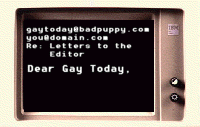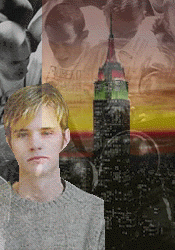 |

|
 Pen Points
Pen Points
Letters to Gay Today |
|
1. Purpose: what are we aiming to achieve. My answer: (a) We want to mobilize g/l/b/t communities (our communities), as well as (b) We want to shake the conscience of America, we want convince people that there is no tolerable, no safe amount of prejudice. I also feel like a conceptual goal like this needs to be linked with concrete action and tangible objectives (whether it's passing hate crimes bills, doing a letter-writing campaign, whatever--something people can participate in). 2. Message. We need a core message, a sound-bite sized idea that we consistently and continually broadcast. First draft of a framing message: 'We are not deviants, we are not sinners. We are PEOPLE. We have a right to live, we have a right to love. Stop the hate, stop the violence' (needs work!). 3. Basic Mechanisms of a Project: We build a link between Matthew Shepard's murder and other anti-gay violence across the spectrum--other murders, beatings, the fear that keeps us from holding hands, the hostile looks and the bigoted epithets. We want to establish that no amount of hate is acceptable by tying the kind of hate most people generally tolerate (e.g., calling someone a faggot, comparing gays to prostitutes or murderers) to the kind of hate most people do not, namely, assault and murder. The best way to do this (from a PR point of view) is to humanize the violence, to put a face on hate statistics. A picture of Julio Rivera, an interview with his parents; a graphic description of the crucifixion and suffering of Matthew Shepard; a story about a fight someone had with their lover about kissing in public; a hospital photo of someone after a bias attack; etc. As for gathering these images and stories, this is just as important a part of the project as broadcasting them to the straight world. It's a call for people from our communities to step forward, to tell their story (and to get re/involved by doing it). 4. Some Strategic Dimensions. There's a short-term horizon and a long-term one we should consider. We must take advantage of public (non-gay) sympathy in the aftermath of the Shepard murder, that is, we need to do something before the 15 minutes of fame Shepard has gotten in death evaporates. But it would be equally foolish to ignore long-term organizing, which again goes back to mobilizing ourselves. (More on short-term and long-term concretes below.) 5. Possible Short-term Stuff. We could put together a quick visually dominant and media-packageable 'memorial' or 'testimonial' highlighting queer-bashing murders and beatings. Coffins, family interviews, gorilla theatre--something like a silent march of x,000 people all wearing bloodied head bandages and carrying simple signs saying "I have the right to live, I have the right to love" to represent the x,000 gays who get assaulted every year; etc., that kind of thing. (I have a personal preference for a street-based kind of thing, for multiple reasons: (a) I think as queers we do street and theatre and that kind of thing well.
6. Possible Longer-Term Stuff. I have in mind an ongoing process of collecting people's stories and turning these into external message (paid or free media, or both, or gorilla postering, etc.) A one-page flyer that frames the issue and also provides a questionnaire--with room to write on it--can be used as the basic organizing vehicle. We just make sure it bulk copies get to every bar, every meeting, every gay-owned business, on-line, etc. I've used this technique ("Our lives matter! Tell your story") successfully in labor organizing. Out of a pool of, say, 100 written responses, you find a dozen or so that are really poignant or well-written or politically astute and you follow up with those folks. Possible ways to use these stories: photo/story/quote series as subway ads (perhaps in groups of three with each ad having a murder an assault an a verbal harassment story, again to keep linking all hate together). Or other media buys. Web presence. Equally important, I think to harness the power of our outrage and the potential of our many talents, perspectives and sheer numbers, this piece of the project should be as widely distributed and OWNED as possible. I'd like to see us encourage g/l/b/t groups of all stripes take the "Tell your story" theme and flyers and use them in ways that fit in with the work they are already doing. In other words, we don't have to re-invent the activist wheel here; the institutions and structures we need to re/build a movement are there, we just need to convince people that they have to get involved. 7. Anyway, that's the start of an idea. I'm not wedded to the particulars, but I wanted to lay out considerations I thought were critical from strategic, organizing and public relations points of view. And again, I think this kind of campaign should have a tag line action item, something concrete for people to do. 8. Final comments. I'm proposing an anti-violence project because I think politically this is the most advantageous strategy. I also think that the community resources are there to make this feasible--I'm thinking in particular about the Anti-Violence Project. Dorothee Benz : dotbenz@aol.com. Why Do We Need Hate Crime Legislation? The point behind the legislation is NOT that one life is worth more than another.
To me, this whole discussion about "not being a part of a victim mentality" smacks of the old argument where your Dad told you that REAL men don't cry. Piffle. Standing up against assaults based on who you are, when this is indeed the case, is refusing to be a victim. Of course, some people will scream discrimination at every turn, but that does not mean that anti-discrimination laws are bad things. Some women will falsely accuse men of rape. That does not invalidate laws against it. I don't know a way to say this that is not offensive, and given the flames (mea culpa, I know) I will ask that you understand that this is not how I mean this, but ~ It almost sounds like you are asserting that you are too manly to seek the assistance of the government if you are the victim of wrongdoing. By Gawd, you can stand on your own two feet! Well, that should not be necessary. As a people, we should be able to help each other, and we should be able to say that people who go around and beat up others (or kill them) simply because of who they are a--- that this (mis)behivour is especially unacceptable. I don't really expect that everyone will agree with this conclusion, but I really liken this sort of thing to the lynchings of blacks in America, which were specifically acts committed to keep all blacks "in their place" and in a constant state of terror. In that way, I believe that KKK lynchings are indeed worse than an individual white guy in Mississipi in 1955 shooting an individual black guy for some entirely unrelated reason. Both victims' lives were of equal value, but the lynching was committed not just to attack an individual, but to attack a whole bunch of people, all the blacks in the area in my example, and keep them subdued, lest they be next. This is exactly what I believe is the intent of bands of straight boys are doing when they seek out & beat up gay men. As this is an attack designed to terrorize all of us, as well as brutalize an individual, this crime is worse. The victims are the same, but the crime is worse. Maybe I would not think this way so much if my High School Gym Coach/Health Ed teacher had not held this up as an example of how homosexuals are to be treated. Granted, this was a quarter-century ago, but I clearly remember sitting in class listening to my coach glowingly describe how he & his buddies, when on shore leave during WWII, would go cruisin' for faggots to beat up. Codifying that this is NOT OK is a step towards diminishing this behaviour. No, all such acts will not stop. But we as a people will be saying that this is unacceptable. Kind of like how the Christian Coalition fights to keep sodomy laws on the books to emphasize that they disapprove of us. Part of this is my frustration with the knowledge that violent crime is very under-punished in this country. If I thought that everybody who beat someone else senseless or killed them would go to jail for a very long time, I might not see the need for this differentiation. But that is not the case, and I believe that people who engage in this sort of terror/genocide need to be put away longer.
From Eclipse
|
© 1997-98 BEI
 Being a PR hack and union organizer by background, I tend to think in
complete campaigns. I wanted to share this idea with as wide an audience as
possible. If people like it, we should modify it as needed and rustle up some
funds (I have some leads on that, too).
Being a PR hack and union organizer by background, I tend to think in
complete campaigns. I wanted to share this idea with as wide an audience as
possible. If people like it, we should modify it as needed and rustle up some
funds (I have some leads on that, too).
 (b) With the (NYC) Mayor's office under fire for First
Amendment abuses on the issue of peaceable assembly, it makes sense to help
keep that issue alive, not least of all because it gives us common ground with
a remarkable number of other communities in New York (hot dog vendors,
construction workers, Harlem residents, etc.), and (c) street-based action
allows for maximum popular participation--you can't really run out of room so
everyone can come. (This doesn't preclude also turning such a project into a
web site or traveling exhibit or other uses.)
(b) With the (NYC) Mayor's office under fire for First
Amendment abuses on the issue of peaceable assembly, it makes sense to help
keep that issue alive, not least of all because it gives us common ground with
a remarkable number of other communities in New York (hot dog vendors,
construction workers, Harlem residents, etc.), and (c) street-based action
allows for maximum popular participation--you can't really run out of room so
everyone can come. (This doesn't preclude also turning such a project into a
web site or traveling exhibit or other uses.)
 Photo: Wired Strategies
Photo: Wired Strategies